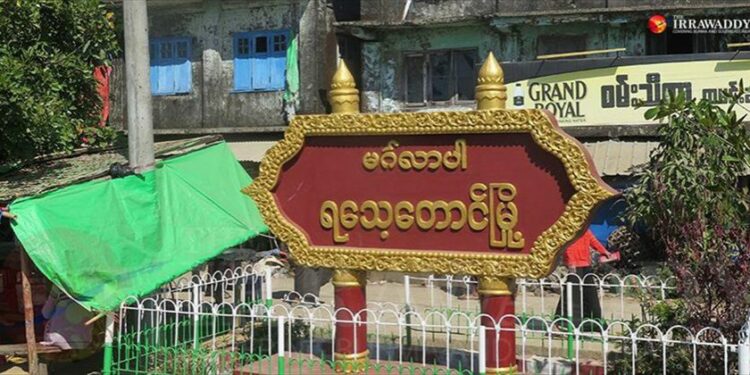YANGON—The Myanmar National Human Rights Commission (MNHRC) on Monday submitted to the President the findings of its investigation into the deaths of seven residents of Kyauktan village in Rakhine State’s Rathedaung Township while in the custody of the Myanmar military on May 2.
Over a period of three days the commission met with over 30 individuals, including eight villagers who are currently being prosecuted by the Tatmadaw as well as their families and relatives; the victims’ families and relatives; those injured in the shooting incident that claimed the seven lives; seven Tatmadaw soldiers—including a battalion commander—assigned to provide security in the area; and doctors who carried out autopsies on the victims’ bodies.
“Based on our findings, we submitted recommendations to the President on what armed groups could do to avoid the deaths, injuries and displacement of innocent civilians in such areas in the future,” U Phone Kywe, a member of the commission, told The Irrawaddy.
The commission declined to provide details of its recommendations to the President. As it is national-level classified information, the commission must hold a meeting about how to inform the public before any information is released, said another commission member, U Yu Lwin Aung.
Lawmakers were present during the commission’s interviews, except for the interrogation of the Tatmadaw soldiers, said U Tin Maung, a Rakhine State lawmaker representing Rathedaung Township, who declined to elaborate on the findings due to their sensitivity.
“It is the people who confer power on the President. The government has responsibility. We feel like the government has evaded this responsibility. We are lawmakers, but we have little authority,” U Tin Maung Win said.
The incident in Kyauktan has left local residents in a state of panic, and the first thought that comes to the mind of villagers in Rakhine State when they see government troops is to flee, said Lower House lawmaker Daw Khin Saw Wai of Rathedaung Township.
“We are demanding that similar incidents do not happen in the future. We demanded that an investigation be conducted and that the necessary action be taken against the Tatmadaw,” she said.
Tatmadaw troops arrived in the village on April 30. They summoned all male residents above the age of 15, then interrogated 275 people at a local school on suspicion of having ties to the Arakan Army (AA). At around 2 a.m. on May 2, six of them were shot dead.
The military says the shootings occurred after the detainees attempted to snatch guns from the soldiers. Eight others were wounded and four went missing, according to a press release from the military.
Ko Aung Lin Kyaw, one of the eight wounded, died in a hospital on May 14, bringing the death toll to seven.
Injured detainees say one man, frightened by the detention, jumped over a fence and escaped. When soldiers fired at the escapee, more than 200 detainees stood up to see what was happening; the soldiers then surrounded the standing crowd from both sides, they say, and began firing at them.
In the aftermath of the incident, the Tatmadaw refused Rakhine State lawmakers entry into the village to investigate.
Locals said Buddhist funeral rites were also denied for the victims. Brigadier-General Zaw Min Tun of the Tatmadaw True News Information Team denied this, however, at a press conference on May 3.
The Tatmadaw later released the remaining detainees and has opened charges against six villagers who it says admitted to being members of the AA.
In its initial statement on May 3, the MNHRC largely repeated the military’s statement, though it urged both sides to exercise extra caution to avoid civilian causalities.
Twenty-four civil society organizations then released a joint statement denouncing the MNHRC’s statement, saying the commission issued it without conducting any inquiries on the ground.

















